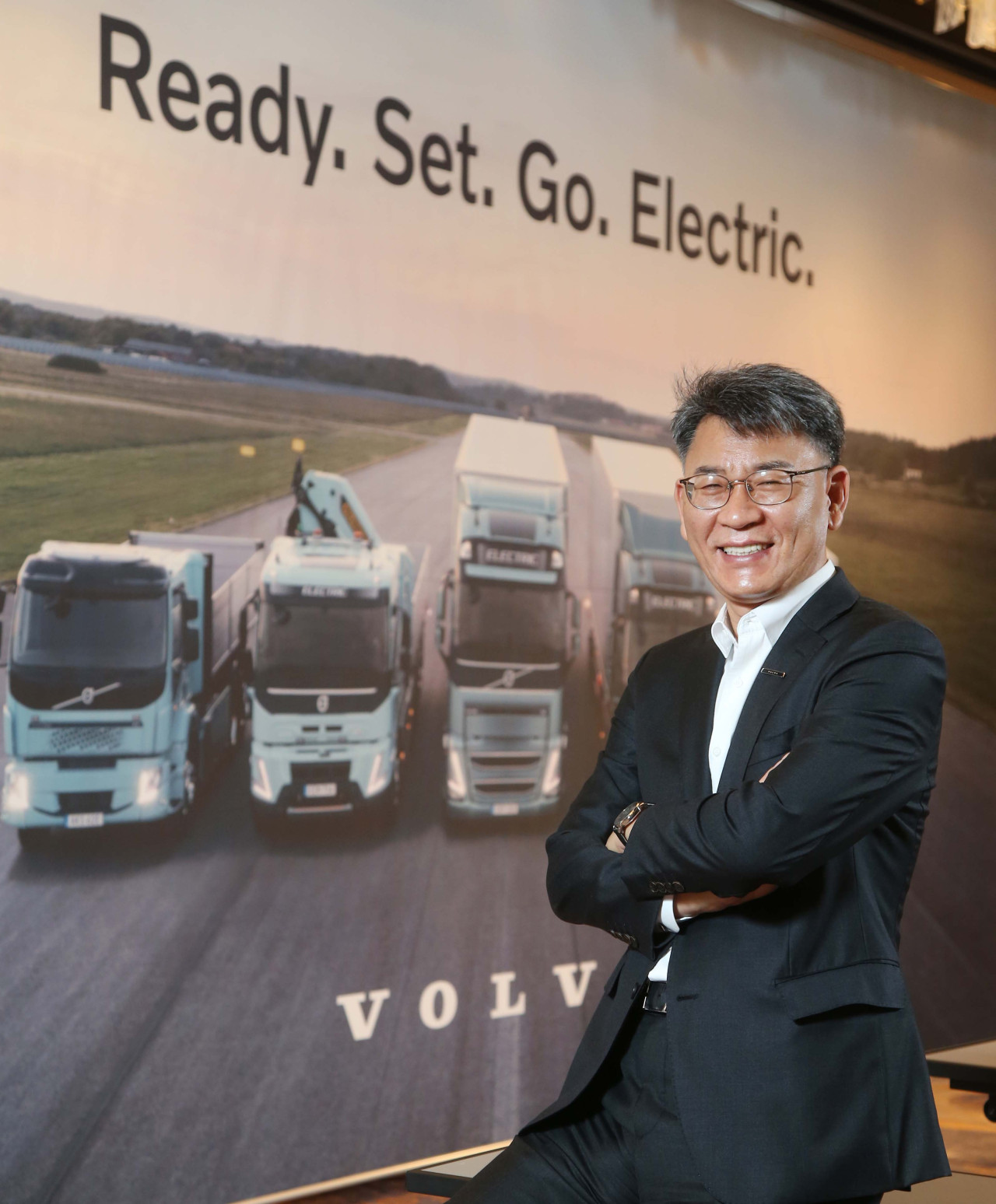[Herald Interview] Volvo out to attract women to logistics while leading switch to electric trucks
Volvo Truck Korea won’t just rely on electric trucks, but to look into other alternatives such as LNG, fuel cell, bio
By Kim Da-solPublished : Feb. 14, 2022 - 16:25

Volvo Truck Korea is looking beyond numbers as it plans to deliver Korea’s first large-size electric truck.
Park Gang-serk, Managing Director of the Swedish commercial vehicle brand's Korean office, said the company wants to add diversity to the commercial vehicle industry by having more women drivers and mechanics.
“The existing cargo, logistics industry has been considered the world of men. Volvo Truck Korea will change such perceptions and invite more women professionals to the industry and create jobs for them -- why not women truck drivers and women mechanics?” said Park in an interview with The Korea Herald on Friday.
“Through our challenge of establishing diversity in the industry, we will create more opportunities for women in the long term.” he said.
For Park, transformation and sustainability are his main focus this year.
“Volvo Truck Korea has received the Market of the year award in the Asia-Pacific (region) last year. We’ve been accredited based on customer trust, their satisfaction and our service network. Moving beyond, my biggest goal is now to make transformation,” he said.
Volvo Truck’s focus on sustainability has been highlighted, as it is set to bring the first heavy electric trucks here.
Volvo Truck’s recent launch of large FH, FM and FMX Electric is not only the result of the Swedish headquarters’ technical solution to reduce carbon dioxide to zero level by 2050, but the output of customization and innovation for evolving truck owners.
“As it is for any other electric vehicles, electric trucks’ batteries are heavy and expensive. Let’s say a truck owner only requires some 540 horsepower for short-distance driving, he can detach two battery packs from a total of six,” Park said, adding that such options allow drivers with economical and efficient driving. All Volvo electric trucks use Samsung SDI batteries.
Exerting a maximum of 224.89 kilogram-meters of torque and up to 670 horsepower when all six batteries are used, Volvo’s latest FH large-size electric truck, which houses a 12-speed transmission, can haul up to 40-tons.
Rapid charging allows 80 percent charging in 1 hour and 30 minutes. The Swedish carmaker’s recent test in Germany showed that 40-ton FH electric truck drove 343 kilometers at single charge with fully loaded cargo.
To minimize risks in off-road driving, Volvo Truck has attached electric motors to the 12-speed automated transmission, unlike other EVs, which attach motors to the wheels.
“This formation (of the electric motor) will prevent the road conditions or accumulation of dust and soil on wheels from affecting the electric truck’s driving performance, also enhancing durability of the motor and the overall condition of the truck,” Park said.
With 25-years of experience in the haulage industry, Park has been appointed to lead the Korean branch of Volvo Truck in 2020. It was when the initial outbreak of COVID-19 had critically hit the truck market, which had already seen fading growth since 2016.
“In terms of customer care, there were so many restrictions. We had to shift all marketing, education and customer service from offline to online. We even hosted an online competition for eco-friendly driver with the lowest fuel consumption as part of our effort to provide breakthrough for interaction with customers,” he said.
To mitigate risks for customers as most people who drive trucks do so for a living, Volvo Truck Korea created a special financial program to delay their hire purchase payments.
With the economy rebounding in early 2021, the local cargo business saw the number of newly registered trucks at 9,400 units, making 20 percent increase compared to some 7,900 units in 2020.
According to Park, with gradually recovering market conditions, Volvo Truck won’t just rely on electric trucks.
“To decide whether it should be electric trucks or hydrogen fuel cell trucks for future in terms of eco-friendly choice, the industry has had only short period of experience. In fact, it really depends on the strategy of us, carmakers. That’s why we are also looking into other substitutional energy sources like LNG, fuel cells, bio and more. We will go one by one, one at a time to launch the eco-friendly truck, alongside the infrastructure installation plan in a long-term,” Park said.
Park said that one eco-friendly option would not be enough to cope with the current logistics and cargo load, so both electric and hydrogen models will eventually run on the road, possibly alongside other models such as those using LNG.





![[Herald Interview] 'Amid aging population, Korea to invite more young professionals from overseas'](http://res.heraldm.com/phpwas/restmb_idxmake.php?idx=644&simg=/content/image/2024/04/24/20240424050844_0.jpg&u=20240424200058)












![[KH Explains] Korean shipbuilding stocks rally: Real growth or bubble?](http://res.heraldm.com/phpwas/restmb_idxmake.php?idx=652&simg=/content/image/2024/04/25/20240425050656_0.jpg&u=)

